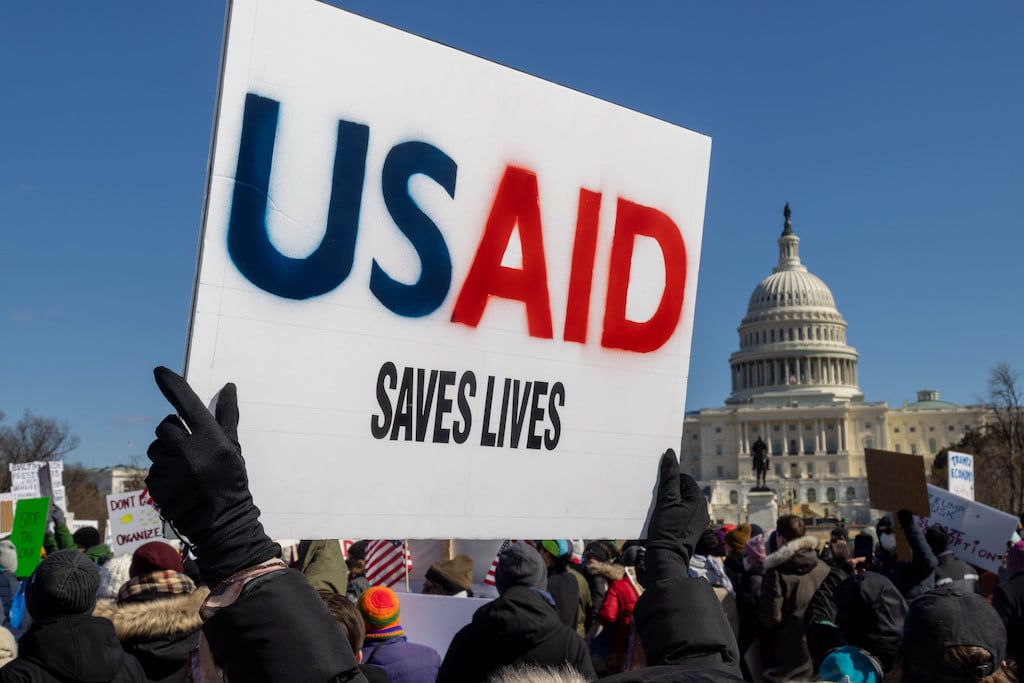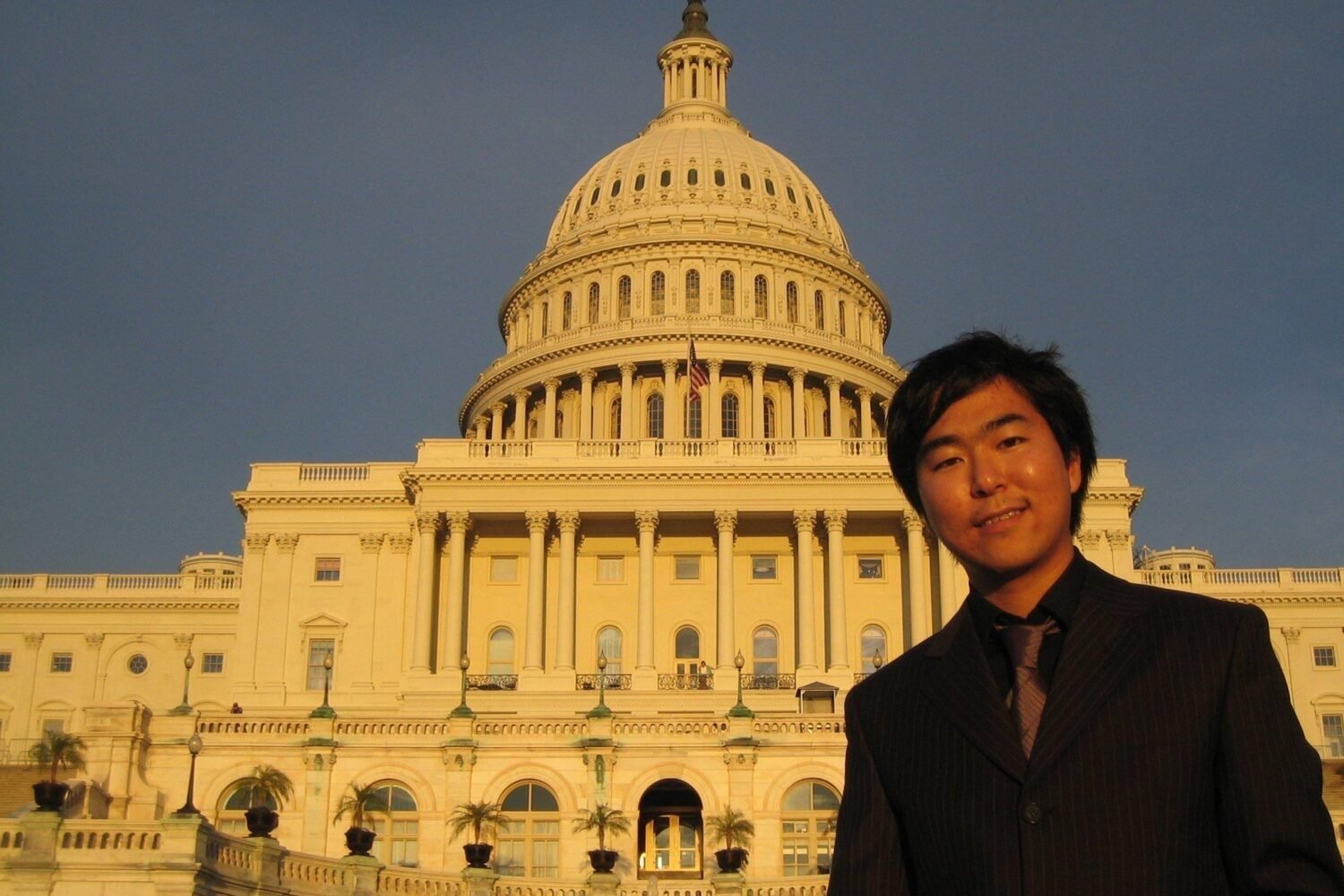In 2019, the Trump administration issued 44 executive orders, signed 94 bills into law and finalized more than three thousand new rules. One hundred judges were confirmed to the federal bench, the most of any year in Trump’s term. Simply put, it was a busy year in Washington.
But there were dozens of stories that flew under the radar—policy changes and personnel sagas, norms eroded and scores settled—that captured the essence of what happened in the marrow of Trump’s government. Often, these stories ran in parallel to the glitzier headlines that consumed Washington (SharpieGate, anyone?). But even as the Ukraine scandal unfolded and impeachment became a certainty, the Trump administration was leaving its mark on policy and government agencies in ways that often went unnoticed, and yet are likely to affect Washingtonians and the country for generations.
A Cabinet secretary held in contempt of court. A labor office whose staff plummeted by 10 percent. Thousands of citizen children facing eviction. A lot happened this year that was easy to miss. Luckily, we were watching the news closely, too. The result is a year-end diary of the company town—a catalogue of the large and small-scale changes that have situated Washington in the age of Trump in 2019.
Housing and Urban Development.
Most overlooked: HUD forgets Puerto Rico. HUD issued disaster relief notices for all eighteen states and territories except one: Puerto Rico, still reeling from Hurricane Maria. The omission seemed like an oversight, until HUD officials acknowledged that the delay was intentional. Two years after Maria, Puerto Rico (whose residents are U.S. citizens) has received about a third of the funds Congress allocated for recovery.
Most WTF: Ben Carson’s “Oreo” faux pas. The Internet came down harshly on HUD Secretary Ben Carson for mishearing “Oreo” instead of “REO” during a hearing. More disconcerting was Carson’s acknowledgement he didn’t know the meaning of REO—a policy that refers to houses owned by HUD. (The program is described on HUD’s web page.)
I asked @SecretaryCarson about REOs – a basic term related to foreclosure – at a hearing today. He thought I was referring to a chocolate sandwich cookie. No, really. pic.twitter.com/cYekJAkRag
— Rep. Katie Porter (@RepKatiePorter) May 21, 2019
Most consequential: Civil rights protections rolled back. The administration moved to make it harder to prove housing discrimination, adding new hurdles for plaintiffs and affording more leeway to landlords and insurers. Fair housing groups warned the new test makes it “virtually impossible” to challenge discrimination.
Honorable mention: Bad news for transgender homeless. HUD reversed Obama-era guidelines, granting homeless shelters the ability to turn away transgender persons on religious or other grounds. Explaining the move to staff, Carson reportedly complained about “big, hairy men” descending on women’s shelters. He later doubled down on the comments.
Statistic of the year: Thousands of children facing eviction. A proposal to rescind housing aid for undocumented immigrants would incidentally evict up to 55,000 children—all of whom are citizens or of legal status, but live with an undocumented family member.
Finance, Treasury and Wall Street.
Least Noticed: Trump loosens the Volcker Rule. The Volcker Rule, adopted after the Great Recession, prevented banks from using capital for proprietary trading. This year, opponents like Goldman Sachs got a “big win” when regulatory agencies voted to ease Volcker’s requirements on banks—eliminating the most stringent requirements and replacing them with the lighter standards of less-capitalized banks.
Most WTF: CFPB tells CFPB to drop dead. Lawyers for the Consumer Financial Protection Bureau asked the Supreme Court to let the agency essentially abolish itself. The request follows a pattern of self-sabotage in 2019. Under director Mick Mulvaney, the agency began instructing consumers not to trust the CFPB’s data. It also advanced measures to unshackle private debt collectors, sanctioning an array of aggressive tactics that experts warn will absolve collectors of fraudulent and misleading behavior.
Most consequential: Banks stop planning for the worst. The Federal Reserve moved to loosen a Dodd-Frank rule designed to avoid another taxpayer-funded bailout, by requiring large banks to prepare a detailed plan for an emergency meltdown once a year. The relaxed rule allows banks to pass the test with plans that are four years old.
Honorable mention: Tax law faces reality. 2019 was the year economists concluded the $1.5 trillion tax overhaul signed in 2017 didn’t pay for itself. In year one, government revenues fell by $83 billion while the economy grew at the same rate as 2015.
Statistic of the year: IRS forfeits $34 billion. A study found that cuts to staff and resources at the IRS allowed public companies to escape paying $34 billion in taxes.
Commerce Department.
Least Noticed: Ross’s rolling ethics fiasco. Commerce Secretary Wilbur Ross was found not to have divested from personal assets until later than promised—including up to $50 million of stock that appreciated seven-fold—prompting an ethics office not to certify Ross’s financial disclosure report. Experts say they still don’t know whether Ross has actually divested; one former official says “a million red lights are going off that there is something odd here.”
Most WTF: Commerce dragoons the weather. After Trump used a sharpie to edit a hurricane map, Ross threatened to fire two officials at the National Oceanic and Atmospheric Administration if they contradicted the President. (Commerce denies the charge.)
Most consequential: Politicizing the Census. The White House had planned this year to finalize a citizenship question on the Census that would swing electoral power to Republican districts. But the Commerce Department’s apolitical rationale for the move was skewered by a federal judge and the Supreme Court, which provisionally blocked the question. Trump vowed to find the citizenship data elsewhere. Describing the Census roller coaster, lawyer and author Josh Matz told Washingtonian, “On a scale of one to ten, measuring the sheer insanity of the administration’s legal arguments…this registered around 11.”
Honorable mention: The secretary’s emails. The Washington Post obtained emails in which Ross was conducting official Commerce business on a personal email account, prompting an investigation. Ross told the Post, “These hysterical, baseless allegations of illegal activity are without merit.”
Labor policy.
Least Noticed: Apprenticeships get privatized. The Department of Labor moved to undercut the federal apprenticeship program. Since the New Deal, the program has ensured apprentices get actual on-the-job training and other benefits, preventing scams in the vocational sectors. The administration has devised a deregulated, “industry-led” program with few safeguards, inspiring opposition from 150 lawmakers.
Most WTF: HR gets religious. The administration proposed to allow hiring and firing on religious grounds for some contractors. Critics have called the rule “taxpayer-funded discrimination”—which is at least half accurate, since it will cost taxpayers $20,325,900.
Most consequential: 3 million lose out on overtime. The Labor Department released long-awaited rules about overtime pay, amending a policy first adopted in the Obama era. Between administrations, the new number of workers eligible to receive overtime was downgraded by 3 million people.
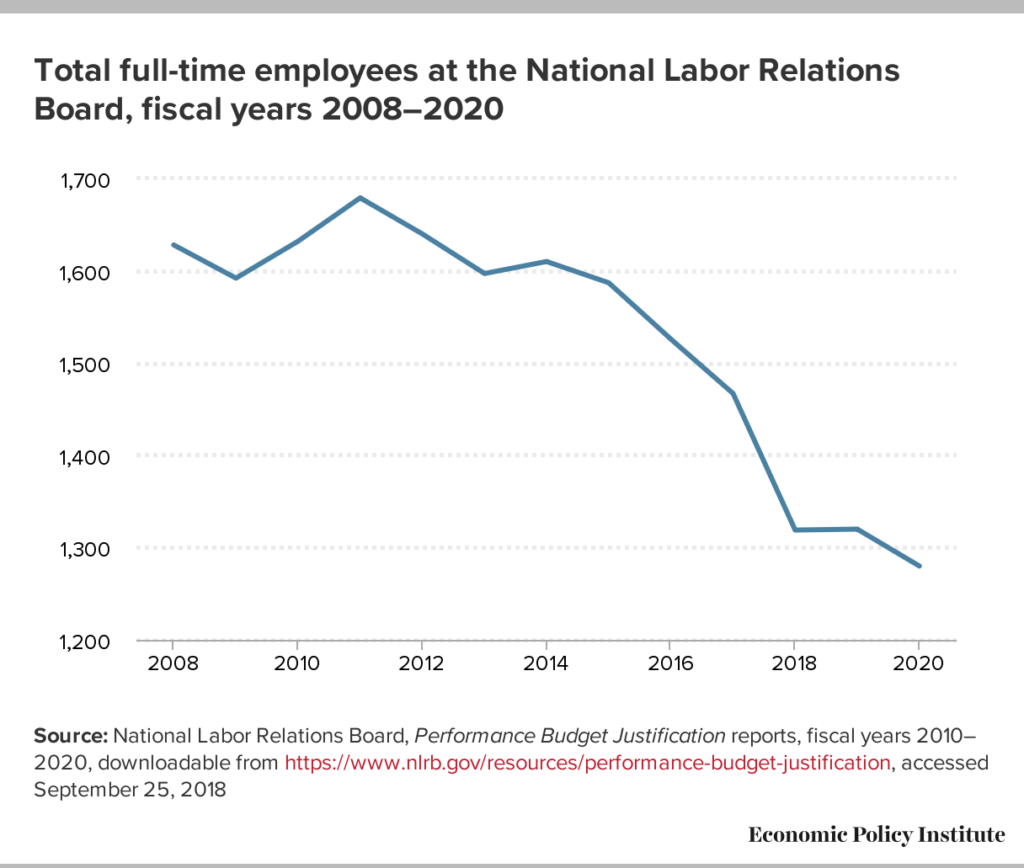
Honorable mention: Civil rights enforcement at historic low. The Equal Employment Opportunity Commission has launched the fewest probes into civil rights complaints in nearly a decade.
Statistic of the year: NLRB hemorrhages staff. After years of decline, the National Labor Relations Board saw its staff abruptly fall by nearly 200 personnel since 2017—ten percent of its total—prompting lawmakers to call for reversing the shortfall.
Veterans and the service branches.
Least Noticed: Navy shuts down climate research. The Navy’s Task Force Climate Change was quietly shut down in March, a move one retired Rear Admiral called “suspicious.” Although the Navy succeeded in shutting down the task force, they forgot to shut down the link: The web portal still redirects to a page that is blank—headlined, perhaps appropriately, “Climate Change Fact Sheets.”
Most WTF: Military getaways at Trump resort. The U.S military spent nearly $200,000 during roughly three dozen stays at a Trump-owned resort in Scotland since 2017.
Most consequential: Immigration policies fall on service members. As the White House advanced a wave of hardline immigration policies, one of 2019’s most persistent themes was how often they fell on the armed service branches.
- A crackdown on poor immigrants seeking green cards didn’t exempt veterans of their families.
- Children adopted or born to some service members overseas are no longer automatically granted citizenship.
- More than $3 billion was drained from military projects to pay for a segment of border wall, including repairs to a middle school at Fort Campbell; the Cyber Operations Facility at Joint Base Langley-Eustis; and a Seawolf security project at Naval Base Kitsap.
- The Coast Guard saw its budget pilfered to help enforce policies aimed at deterring asylum seekers.
- More than $200 million was diverted from a military pension to pay for part of a border wall.
Honorable mention: Trump intervenes in war crimes case. After Tweeting his support for Edward Gallagher, a Navy Chief Petty Officer charged with murder, Trump personally intervened in the case to reverse the Navy’s punishment, an extraordinary step. The imbroglio led to the firing of Navy Secretary Richard Spencer, who warned that Trump’s move sent the message that “you can get away with things.”
Statistic of the year: Transgender troops shut out. The Pentagon’s ban on transgender troops went into effect. The order could impact as many as 6,000 troops estimated to be on active duty.
Education.
Most overlooked: DeVos slapped with contempt ruling. A federal judge ordered Education Secretary Betsy DeVos to stop collecting on student loans from a fraudulent for-profit college—but she didn’t, continuing to garnish wages of students victimized by the fraud. The judge held DeVos in contempt, ordering her to pay back the students. The department now admits in court they underreported the number of targeted students by almost thirty thousand.
Most WTF: Diversity office mysteriously ransacked. An Education staffer found her office in disarray, her African figurines missing heads and limbs, and a framed civil-rights era poster of a black schoolgirl shattered on the floor. The staffer had recently been tasked with conducting diversity training. A department investigation suggested the artwork fell off the well.
Most consequential: For-profit colleges off the hook. In June, DeVos repealed a signature Obama-era rule that protected students from fraudulent for-profit colleges, by requiring proof that their degrees result in gainful employment for graduates.
Honorable mention: Accreditation weakened. The rules that guide how educational institutions gain their accredited status, and who accredits them, underwent a major rewrite this year, with some experts calling it “the largest unraveling in history of rules that guide accreditation.”
Health care.
Most overlooked: Congress deletes Obamacare. Senators thought they were tinkering with the Affordable Care Act when they lowered the bill’s individual mandate penalty to $0. Instead, a federal judge in Texas ruled the zero-dollar provision made the entire law unconstitutional. This year, a federal appeals court agreed, though it remanded the case with the goal of salvaging parts of the law. If upheld, the ruling—almost certain to reach the Supreme Court—will cost 17 million Americans their health insurance.
Most WTF: Medicaid Chief cadges for Ivanka bling. Medicaid and Medicare chief Seema Verma requested $47,000 in taxpayer-funded reimbursements for stolen jewelry and other items—including a pendant from the Ivanka Trump jewelry line made of gold, diamonds and prasiolite, which Verma reported was worth $5,900.
Most consequential: Women’s healthcare dealt a blow. The White House found a new cudgel in its salvo on Planned Parenthood: Title X, the popular program that provides non-abortion health screenings for poor and uninsured women. A new White House policy rescinded Title X dollars for clinics that provide abortion referrals. The rule has already resulted in a loss of health funds for more than 850 clinics—as well as Planned Parenthood, which had covered 40 percent of Title X recipients, including the entire state of Utah.
Statistic of the year: Uninsured grows to record number. The number of Americans without health insurance reached a three-year high in 2019.
State Department.
Most overlooked: Staffers punished for being “disloyal.” Long before Marie Yovanovitch, State Department officials suffered MAGA-touting supervisors from hell. An investigation found Trump appointees “frequently berated employees,” calling career staff “traitors” and “disloyal,” and one employee removed after they raised concerns about the partisan atmosphere.
Most WTF: Trump staffer fudges resume. Mina Chang, a deputy assistant secretary, falsified details on her résumé—including that she graduated from Harvard Business School and a program at the Naval War College—and photoshopped herself onto a cover of TIME Magazine that appeared in an online video.
Most consequential: Gaping vacancies. More than a fifth of key offices are still vacant in the State Department as Trump enters the final year of his term—including a quarter of ambassadorships. There is no Senate-confirmed ambassador to Pakistan or Brazil, nor undersecretaries for four of the ten highest offices at Foggy Bottom. Other arms of foreign policy are similarly understaffed: at USAID, about half of top positions remain vacant.
Honorable mention: Underwriting harassment of journalists. A State Department program that counteracts foreign propaganda itself funded an online group known to harass American reporters and academics with exaggerations and falsehoods. Following the revelation, the program’s funding was frozen.
DHS and immigration policy.
Most overlooked: Trump’s never-disclosed immigration directive. The year was rocked by controversial immigration policies. But some experts are beginning to believe there may be immigration policies the White House never published and kept hidden from public review. A little-noticed lawsuit this year in D.C. alleges that asylum seekers abruptly saw their “credible fear” tests—the first hurdle to apply for asylum—mysteriously denied at rates that skyrocketed from 3% to a staggering ninety percent. The lawsuit alleges that confidential rules may be the cause—such as rejecting a refugee before the interview is over, or holding multiple interviews to provoke inconsistencies—and that the changes were hidden from Congress.
Most WTF: DHS gets idea from “Orange Is The New Black.” ICE shut down a toll-free legal aid hotline for detained migrants, two weeks after it was conspicuously featured on the show Orange Is The New Black.
Most consequential: Making life miserable for legal immigrants. When the White House announced its public charge rule—denying green cards based on applicants’ need for public services—it was only the culmination of a year marked by similar efforts to make legal immigration more difficult at nearly every stage. Efforts included:
- Hiking the fee to appeal an asylum case from $110 to up to $1,000.
- Requiring visa applicants to prove they can obtain health care within 30 days of arrival, and have the resources to pay for medical costs.
- Indefinitely withholding work permits from asylum applicants.
- Denying high-skilled H1-B visas at record-high rejection rates, which typically benefit the tech sector. (The denial rate for Amazon, for example, has quintupled under Trump.)
- Announcing rules that will strip the spouses of H1-B recipients of their work permits.
- Creating new bureaucratic hurdles for those seeking permanent residence, such as forcing applications be filed one-at-a-time instead of simultaneously.
Honorable mention: Extending family detention. The administration pushed forward on plans to detain immigrant parents and children indefinitely. (The pending program has been blocked in court.)
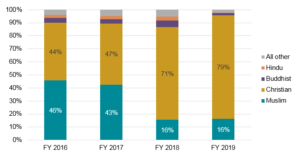
Statistic of the year: Muslim versus Christian refugees. The share of Muslim refugees admitted has been cut by more than half. During the same period, the share of Christians increased to nearly 80 percent.
EPA and climate change.
Most overlooked: Censoring science. The EPA advanced rules that require scientific datasets to be publicly revealed—a poison pill, essentially, to winnow down the types of reputable scientific input that EPA staff can use to draft policy. Opponents say the rule resembles the tobacco industry efforts to stanch research.
The administration has trailblazed similar “back-end” techniques to restrict science—“drastically” restricting the range of evidence used to regulate Mercury, for instance, and artificially limiting computer climate models. They’ve also zeroed in on scientists, replacing EPA experts and academics with industry advocates, ignoring advisory panels, and generally making life torturous for career staff. This year, three separate scientists—from the Agriculture Department, National Park Service and Centers for Disease Control—each came forward with similar stories of scientists being punished for researching climate change. One scientist told the New York Times: “It reminds me of the Soviet Union.”
Most WTF: Crickets at the Weather Service. The administration has inexplicably declined to fill positions at the National Weather Service—a growing bête noire of some Trump activists, who have argued for privatizing weather prediction. There have been more than 400 vacancies reported.
Most consequential: A wave of new rules. The White House has advanced a barrage of deregulatory policies this year. In 2019, the Trump administration:
- Reopened waterways once protected under the Clean Water Act to more pollutants.
- Lifted protections on methane so drastically the move was met with objections by Exxon, Shell and BP.
- Repealed the Clean Power Plan, undoing national limits on emissions.
- Revoked California’s ability to set vehicle emissions standards, overruling an agreement the state struck with automakers.
- Significantly weakened the Endangered Species Act to clear the way for drilling and mining.
Honorable mention: Wall Street buries environmental infractions. The Securities and Exchange Commission plans to allow companies to report fewer environmental penalties to the investing public. The SEC would let companies decide which penalties are relevant, while raising the reporting standard threefold—though the SEC is considering relaxing the standard by as much as ten times that amount.
Statistic of the year: A study this year found 9,700 more Americans died due to air pollution in 2018 than in 2016, due in part to regulatory changes.
Energy policy.
Most overlooked: DOE’s stall strategy. The Senate found the Department of Energy has missed legal deadlines for 25 energy efficiency standards mandated by Congress.
Most WTF: Trump’s dishwasher obsession. The conservative activist pushing for a DOE rule to bring back inefficient dishwashers—a rollback so excessive even manufacturers oppose it—is 24-year-old Daniel Savickas, who really doesn’t like his dishwasher. “The dishwasher in my apartment is absolute garbage,” Savickas complained to the New York Times. “I have to run cycles multiple times.”
Most consequential: Coal plants get a power-up. A proposal changes how electricity is priced on the energy grid, boosting profits for coal plants and some nuclear facilities.
Honorable mention: Lightbulb prospects go dim. The White House officially killed a rule this month in order to roll back efficiency standards for light bulbs. The reversal is estimated to cost $14 billion for consumers and add 38 million tons of CO2 per year into the atmosphere.
Agriculture.
Most overlooked: Crackdown on food benefits. The administration is moving to prevent states from offering more generous food subsidies, known as SNAP benefits. Thirty-nine states would have to cut SNAP beneficiaries.
Most WTF: Relocation scheme backfires. The Agriculture Department announced a controversial plan to relocate two science and economic offices out of DC—moves Mick Mulvaney privately suggested were aimed at obliterating the divisions. But the scheme has not exactly gone as planned: So many staffers opted to resign in protest that the department has had to offer temp work to retirees around the DC area.
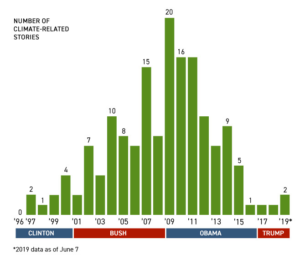
Most consequential: Clamping down on climate research. A Politico investigation found the Agriculture Department wouldn’t publicize dozens of studies on the effects of climate change, such as nutrient runoff in the Mississippi, decompensation of rice crops, and longer allergy seasons.
Honorable mention: Slashing pork, literally. A new policy successfully curtailed health inspections in pork slaughterhouses, allowing companies to inspect themselves. Two whistleblowers have come forward to caution that unsafe pork is reaching supermarkets, warning that “the consumer is being duped.”
Statistic of the year: Corporate welfare for farms. Trump promised that a $6 billion aid package to farmers—compensation for the effects of trade policies—would make small farms the “big beneficiaries.” An analysis instead found that the richest 10% of industrial farms received 50% of the aid package.
Interior Department and federal lands.
Most overlooked: Parks Service broke the law. A government watchdog found the Interior Department broke the law during the government shutdown, when it used funds from park coffers to keep national parks open, presumably to blunt political fallout.
Most WTF: Interior shuts out oversight. After an allegedly “aggressive and unprofessional” phone call from a House Appropriations staffer, officials at the Interior Department suspended department-funded oversight trips. It’s not clear what, exactly, got the Interior officials so upset. House staffers said the tiff was “concocted” to “stymie the House’s critical oversight work.”
Most consequential: Anti-public lands activist guards public lands. A longtime opponent of public lands policy, William Perry Pendley, was picked to lead the Bureau of Land Management, where he is tasked with overseeing the government’s 245 million acres. Pendley has proposed selling off almost all federally-owned lands.
Honorable mention: Secretary lasts a week before investigations. Less than a week after being confirmed by the Senate, Interior Secretary David Bernhardt became subject of an internal investigation over alleged ethics violations, which included intervening to halt a report about pesticide impacts on endangered species. (A report cleared Bernhardt of legal wrongdoing while acknowledging the intervention was “unusual.”)
Statistic of the year: New BLM down to skeleton crew. The BLM’s effort to relocate its headquarters to Colorado has found few takers: At last count, just two employees have made the move. Bureau staffers expect major losses, including career staff who manage of hazardous materials and oil and gas development.
Ethics and the rule of law.
Most overlooked: ‘Acting’ nation. The administration announced a new rule allowing itself to promote agency officials without authorization from a permanent director—a move that normalizes the unprecedented number of “acting” directors throughout the federal government.
Most WTF: Federal Elections Commission becomes powerless. After losing its final voting voting member for a quorum, the FEC is essentially paralyzed before the 2020 elections. A commissioner told Washingtonian the loss is a “broader strategy to try to reduce the impact of this agency.”
Most consequential: Murder on Fifth Avenue goes from fantasy to legal argument. Donald Trump’s personal lawyer told a federal judge that the president is immune from criminal prosecution in office under any circumstances—even shooting someone on Fifth Avenue, as Trump once boasted during his campaign. The legal argument, which will likely reach the Supreme Court, goes to the heart of the doctrine marshaled by the Trump administration in its arguments of absolute immunity, including its blanket refusal to comply with subpoenas in the House impeachment investigation.
Honorable mention. Trump-appointed ethics office: Fire Conway. Several administration officials have been found in violation of the Hatch Act, the law that prevents overt political activity in public office. They include Lynne Patton, a HUD official, and Kellyanne Conway—who violated the law so many times that the Office of Special Counsel urged the White House to remove her, writing that her actions “erode the principal foundation of our democratic system—the rule of law.”
Statistics of the year: Three-way tie.
-
- Lobbyists in the Cabinet. Trump has set a record for former lobbyists in a presidential Cabinet in under three years.
- IRS boosts dark money. The IRS advanced guidelines to allow groups like the NRA, ACLU, Chamber of Commerce and labor unions to omit the names of large donors from tax forms.
- Unqualified judges. The Trump administration has set a new record for nominating the most judges to receive an “unqualified” rating from the American Bar Association.
Bonus: From the ‘Why We’re Here’ Department.
In October, the Washington Post reported the following news:
“A multiyear State Department probe of emails that were sent to former secretary of state Hillary Clinton’s private computer server concluded there was no systemic or deliberate mishandling of classified information by department employees, according to a report submitted to Congress this month.
The report appears to represent a final and anticlimactic chapter in a controversy that overshadowed the 2016 presidential campaign and exposed Clinton to fierce criticism that she later cited as a major factor in her loss to President Trump.”








